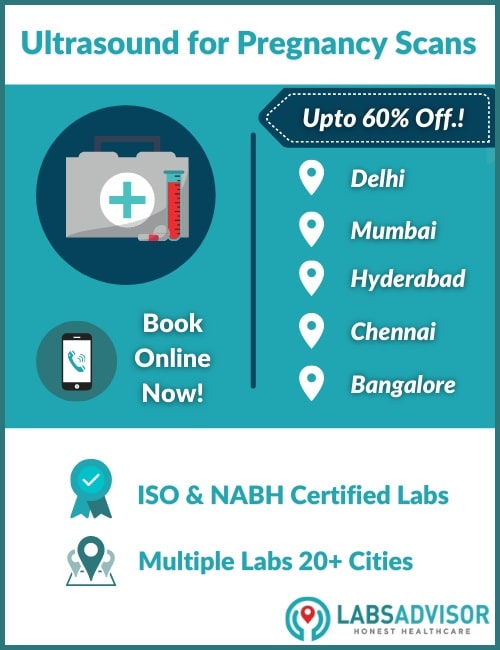
Ultrasound is a medical scan that helps create images of the body parts or of a growing baby in case of ultrasound during pregnancy. Sound waves, which are totally harmless, are transmitted to the body part under inspection.
Book your USG scan for pregnancy at your local top-quality labs through us at up to 60% discount. The lowest Pregnancy Ultrasound cost in India is ₹250 only.
Ultrasound Scans for Pregnancy Test in India Through LabsAdvisor
|
Book Ultrasound online yourself at any time of the day or night by clicking on the appropriate link in the table below.
Ultrasound Scans for Pregnancy test price in other Indian cities
We offer the Ultrasound for a Pregnancy test in over 20 Indian cities. Click on the link of your city below to choose a lab and make an online booking for home collection at a suitable time.
| City for Ultrasound scans for Pregnancy | price starting from |
| Ultrasound Level 2 Price Near You | ₹600 |
| Ultrasound Obstetrics or Obs Price Near You | ₹250 |
| Ultrasound NT Scan Price Near You | ₹638 |
| Doppler Obstetrics Price in Near You | ₹1553 |
| Ultrasound Biophysical Profile Price in Near You | ₹500 |
| Ultrasound TVS Price in Near You | ₹300 |
| Ultrasound Whole Abdomen Price in Near You | ₹350 |
If your city is not listed in the table above, call us on +918061970525. We will get back to you with the price of the Ultrasound scans for the pregnancy tests at your location.
Get the lowest price for your Ultrasound scans for a pregnancy test by calling us at
If you want us to call you back, click on the link below
The discounts on the Pregnancy Ultrasound price are available only to those who made the booking through LabsAdvisor.com. You will be asked to pay the actual pregnancy sonography price if you do not carry the booking confirmation message sent by the LabsAdvisor.com

Frequently Asked Questions About Pregnancy Ultrasound
What is Ultrasound?
Ultrasound is a medical scan that helps create images of the body parts or of a growing baby in case of ultrasound during pregnancy. Sound waves, which are totally harmless, are transmitted to the body part under inspection.
These waves then create an image of the part being tested. For pregnancy ultrasound, sound waves bounce off of the baby, and these waves are recorded and converted into video images, leading to tracking your baby’s shape, position, and movements.
The ultrasound during pregnancy can create images of the placenta, uterus, and baby. The doctor gets to inspect the progress of pregnancy and the baby’s health with the use of ultrasound tests.
Ultrasound is also called USG or Sonography.
Ultrasounds in the First Trimester:
Primarily, trans-abdominal ultrasounds are performed during pregnancy. These ultrasounds are noninvasive which means nothing is put in the body. In some cases, a transvaginal ultrasound (TVS Ultrasound) might be required to get a better image of the baby.
TVS ultrasound is very safe. It is commonly performed during all the stages of pregnancy, including the first trimester. It poses no harm to you or to your baby.
Trans-abdominal Ultrasound or Ultrasound Whole Abdomen:
Trans-abdominal ultrasound is a process in which your abdomen is scanned by the ultrasound probe. Before scanning, a small quantity of gel is put on the lower abdomen with the help of the ultrasound probe. This is done to improve the contact between your skin and the probe.
After this, the scan is done by moving the ultrasound probe along the lower abdomen. While the probe is moved along your abdomen, the real-time images from this test are being sent to the ultrasound machine. You can see the images as they show on the ultrasound machine. A good ultrasound technician will also explain to you what the images mean e.g. when can you see the heart of the baby beating.
Transvaginal Ultrasound / Ultrasound TVS:
Transvaginal ultrasound (TVS ultrasound) is an internal ultrasound. In this technique, an ultrasound probe is put into the vagina to capture the images. Because of the technique and procedure involved, the transvaginal ultrasound produces far better and clearer images of the female pelvic organs. A better understanding is also achieved since the ultrasound probe lies closer to these structures.
The transvaginal ultrasound probe is thin in diameter. It is covered with a disposable protective covering. At the end of the probe, a small amount of ultrasound gel is placed so that it doesn’t cause much discomfort. The probe is then inserted a short distance into the vagina slowly and gently.
The transvaginal ultrasound mostly causes less discomfort than performing a pap smear. No analgesia is required in this technique.
Special efforts have been taken to ensure that your privacy is always respected during your ultrasound, especially the transvaginal examination. In addition to wearing a gown, a large towel will also be provided to cover our lower body during the transvaginal ultrasound. You may specifically ask for a lady ultrasound doctor to do an ultrasound.
LabsAdvisor.com can help you find a lab that offers lady doctor services.
Obstetrical Ultrasound / Ultrasound OBS / Level 1 Ultrasound
Another ultrasound scan that is usually recommended during the first trimester is called Ultrasound Obstetrics or Ultrasound Obs. It is also referred to as Level 1 ultrasound. It is done in the first trimester to check whether the fetus is inside the uterus and to check the fetal heart rate.
There could be a number of reasons why your doctor may request this ultrasound. Some of them are listed below –
- Confirming the presence of your baby’s heartbeat.
- Confirming the correct dates of your pregnancy.
- Confirming the location of your pregnancy.
- Determining the number of babies present.
- Identifying pregnancies at increased risk of miscarriage or pregnancy loss.
- Checking other pelvic organs.
- Your doctor may be concerned about your pregnancy because of abdominal pain or vaginal bleeding.
Ultrasound in Second Trimester
There are primarily, three ultrasound scans that are done in the second trimester of pregnancy. They are
- Level 2
- NTBT Scan
- Biophysical Profile
The key reasons for these ultrasound scans are given below and we explain each ultrasound in more detail after that.
- The baby’s anatomy or structure.
- Measurements of the baby.
- The baby’s heart rate and rhythm.
- The number of babies.
- The position of the placenta.
- The amount of amniotic fluid around your baby.
- The length of the cervix.
- 3D / 4D images of your baby.
Level 2 Ultrasound
A level 2 ultrasound gives a very specific glimpse of the baby growing in your uterus. Also called the 20-week anatomy scan, this test is a great way to see how the baby is developing and assure positive growth symptoms.
This ultrasound gives you the first picture of your baby and makes sure you have many more of these in the days to come.
NT (Nuchal Translucency) Scan / NTBT Ultrasound Scan
This test is done to assess the developing risk of Down’s syndrome and other genetic abnormalities. It measures the amount of fluid in the translucent space in the baby’s neck.
There is a larger amount of this fluid in babies with abnormalities which makes this space appear bigger than average. The NT scan must be done during 11-14 weeks of pregnancy.
Biophysical profile
This ultrasound is done mainly to check whether the baby is getting enough oxygen in the womb. It tracks the baby’s movements and tests the amount of amniotic fluid. It also monitors your baby’s heartbeat for around 20 minutes (non-stress part).
The main results of this test include heartbeat, body movement, muscle tone, breathing, amniotic fluid. A perfect score of 10 ensures that the baby is healthy. A score below 8 needs retesting or early delivery, whatever the doctor recommends.
Ultrasound in Third Trimester:
The last ultrasound for many women takes place at their 20-week anatomy scan. If you have gone past your due date, your doctor might want to keep a close eye on your baby. This is done with the use of fetal heart-rate monitoring and ultrasounds to assess the amniotic fluid levels.
Some other reasons are also there for third-trimester ultrasounds. These include concerns about the health of the placenta and questions about whether your baby’s growth is on track. Just think of those sessions as time spent getting to know your baby. Soon enough, you’ll be looking right in his baby blues.
Some possible ways to keep a check on the well-being of your baby are by measuring him, looking at his blood flow, or simply just by watching him move around. A healthy baby stretches and flexes, opens and closes his hands, wiggles his fingers and toes, moves his arms and legs and moves his lips and tongue.
He also breathes the amniotic fluid into his lungs. This helps the baby to mature. One can get an idea of how their baby will look from the picture of the baby’s face in the third trimester.
It is mainly performed for:
Monitoring baby’s growth.
- Position of the placenta.
- Monitoring of twins pregnancies.
- Position of your baby.
Other topics you may be interested in are listed below:
- Transvaginal Ultrasound test cost in India
- Ultrasound Level 2 test cost in India
- Double Marker test cost in India
- Triple Marker test cost in India






